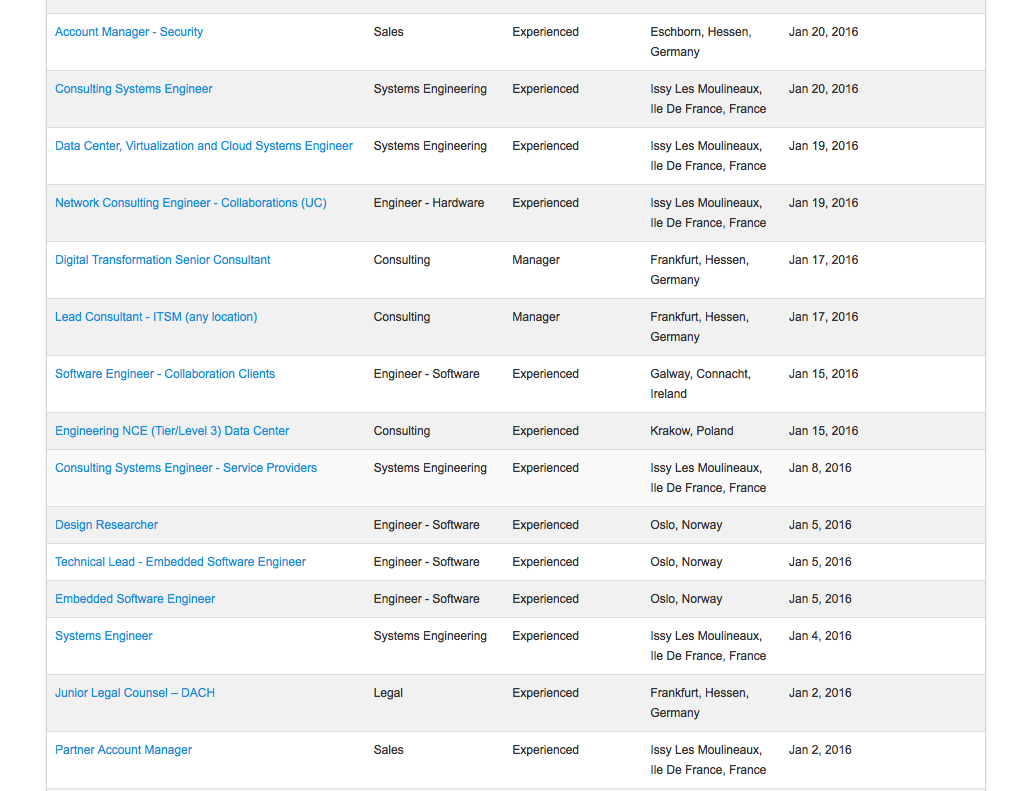Until this week, stock markets around the globe were down. Way, way down.
Oil and other commodities haven’t just tanked, they’re at historic lows. Pundits are predicting the end of a united Europe. And yet, if you’re an expat with hard-to-find digital skills, high-tech firms still love you. You will not only always be employed, top global companies are looking for you as we speak.
Take for example Cisco Systems. It seems like you can’t go online without reading about some big Cisco expansion in Europe. Executives at the San Jose-based networking systems giant announced they will add 200 jobs at the Cisco Meraki offices in London by the end of 2016. Last year, Cisco made substantial acquisitions in Britain, including the $700 million purchase of London-based Acano as well as Watford, England-based consultancy firm Portcullis Computer Security.
In fact, Cisco has been creating jobs much more aggressively abroad than in the United States. Since 2010, it has added 10,900 employees in the U.S., but 21,350 outside the U.S. At end of the 2000s, 46 percent of employees were outside the continental United States, up from 26 percent at the beginning. Cisco has positions open now in France, the UK, the Netherlands, Poland and other locales around Europe.
Right now, Cisco has pages and pages of current openings listed in almost every country in Europe from Romania to Spain.
We chose this listing for a data center, virtualization and cloud systems engineer at random off the Cisco career page because it’s based in Paris. And who doesn’t want to live in Paris? (Qualified candidates will speak both French and English fluently, according to the website.)
The description includes knowing how to “develop technical Data Center, Virtualization & Cloud practices of our customers and partners: plan and deliver technical activities, create intimacy to influence partner’s Data Center practice with a focus on DC Switching and SDN technologies.” You can apply here.
Here’s a screen shot of just one page on the Cisco careers website:
So, that’s a sample from a high-tech company. What about the conventional businesses? Well, they don’t get much more conventional than General Electric. That said, America’s largest industrial conglomerate is transforming itself as we speak.
The soon-to-be Boston-based conglomerate is running a quirky TV advertising campaign in the United States, trying to lure young software developers. This is all part of a shift by the United State’s largest manufacturer to move from heavy industry such as jet engines and into digital technology. The company has a new ad campaign (see below) featuring “Owen,” a young programmer who’s trying to explain to friends and family how his new job at the cool new digital GE has nothing to do with the company’s old business lines. All spots encourage viewers to check out GE’s jobs Web page, which you can see here.
To be sure, GE is re-balancing its employment structure in Europe as it phases out blue collar jobs in Germany and France after buying Alstom, a German company that builds electric power turbines. But if you peruse GE’s career pages for Europe, you’ll see jobs for pre sales solution architect in the Netherlands, Germany and France.
Here’s what a pre sales solution architect does in GE engineer-speak:
This Pre Sales Solution Architect (SA) will provide technical expertise, a pre-sales software skill set, market knowledge and a systematic problem-solving approach, primarily for the upstream, midstream and downstream Oil & Gas market. The SA will establish a trusted advisor relationship with both our external customers and internal technical and commercial teams.
Also in Germany is a position for an embedded systems research engineer.
- Develop advanced embedded systems architectures for applications within critical infrastructure (mining, healthcare, aviation, etc)
- Work with GE businesses to identify their real-time processing needs and formulate system requirements
- Keep abreast of embedded computer system developments and identify suitable opportunities for new technologies
- Participate in and lead projects from embedded system conception to implementation and validation
- Work with other engineering disciplines (mechanical, electronics, control theory etc.) to develop innovative solutions
- Document work in reports, conference papers, and presentations to all levels of management
There are lots more positions, but the jobs are listed by country, business segment (corporate, digital, health care, oil & gas, etc.), skill categories and experience. And the website is corporate clunky. (Aren’t they all!) But you get the idea.
We emailed the GE media guy in Europe for more details, but didn’t get a response.
Of course, the big news last week was Seattle-based retailer Amazon accelerating its expansion plans for Europe. Amazon executives plan to create several thousand jobs in Europe in 2016, more than 2,500 of which will be in Britain. The retailer/fulfillment giant already has a ton of openings across Europe.
Technical Account Manager / Amazon Web Services – München / Berlin / Düsseldorf / Frankfurt
The Enterprise Account Engineer (EAE) functions as part of the Developer Support team to ensure key enterprise customer success in building applications and services on the AWS platform serving as their Technical Account Manager. The EAE provides assistance to the customer as an expert on the full line of AWS services and the customer’s architecture in support of strategy questions, project planning and launch and ongoing operational issues. EAE’s are engaged at the account level in providing recommendations and proactive advice through all phases of the implementation life cycle.
Of course, working in Europe requires that you – the non-EU expat– jump through a lot of hoops. And a realistic chance of getting a great job comes down to who you are. Do you have tech skills , diplomas and certifications that are in short supply in Europe? Are you bilingual? Did you attend university or even gymnasium in a European country? If you answered “yes” to any of those questions, you’re going to have a much easier time finding your dream position in your dream city.
The fine print on non-EU expats working in Netherlands, for example, from Undutchables Executive Consultant Karin Björkman Tendijck:
If a company in The Netherlands (Dutch or international) would like to hire non-EU citizens, they need to arrange a working permit for the candidate. You can find more information at www.ind.nl (immigration office). A company can hire U.S. citizens for positions here and is not restricted to hiring local employees. But again, the (company) will need a working permit. A company can register via the IND to hire candidates on a ‘knowledge migrant’ visa, which is a quicker process in order to get the working permit. Again, all this information you can find on www.ind.nl
Netherlands policy for highly skilled migrants:
A highly skilled migrant seeking employment in the Netherlands must earn a minimum gross income of EUR 4240,- per month excluding holiday allowance or, under the age of 30, EUR 3108,- per month excluding holiday allowance. The income criterion does not apply if the employee is hired by an educational or research institute, or is a postgraduate student or university lecturer younger than 30.
From 19 December 2007, graduates who have finished their studies in the Netherlands are eligible for a knowledge migrant permit (kennismigrant). To qualify for this permit, a graduate has to earn a minimum of EUR 2228,- monthly ex holiday allowance.
An employer who hires a highly skilled migrant is not required to obtain a work permit for this foreign national employee, who nonetheless must have a residence permit. The application for the Dutch residence permit must be submitted by the foreign national employee to the Dutch Immigration and Naturalization Service. The IND aims at processing these applications swiftly, if possible within two weeks. Our experience, however, is that the IND usually takes longer to process a residence permit.
Employers have to have a contractual agreement with the IND that allows them to employ highly skilled migrants.
For more information, please visit the IND website (the Dutch Immigration and Naturalisation Office).
Co-CEO of Dispatches Europe. A former military reporter, I'm a serial expat who has lived in France, Turkey, Germany and the Netherlands.
















